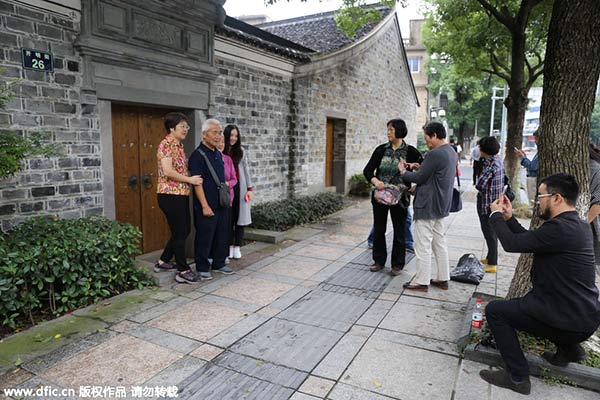Nobel winner's home becomes instant attraction
Updated: 2015-10-08 07:36
By Zhou Wenting(China Daily)
|
||||||||
 |
|
Tourists pose for a photo in front of Tu Youyou's former home in the old town of Ningbo, Zhejiang province. [Photo/IC] |
China's admiration of outstanding scholars has turned the well-preserved childhood home of Tu Youyou, the Chinese pharmacologist who won this year's Nobel Prize in Physiology or Medicine, into a popular tourist destination.
Since it was announced on Monday that 84-year-old Tu had become the first Chinese citizen to win the international prize, her former home in the old town of Ningbo, Zhejiang province, has attracted visitors, especially parents and their children-even though it is not open to the public.
The house, which is for sale, is part of a complex of 37 traditional buildings, including several city-and district-level cultural relic preservation sites, that have been transformed into a high-end art and commercial zone.
Tu won the prize for developing a lifesaving malaria drug, artemisinin, a staple of traditional Chinese medicine, which has helped save millions of lives across the globe.
"There are continually parents taking their children, from infants in strollers to college students, to take photos in front of Tu's former home. Security guards have been ordered to go on patrol around the clock," said a salesperson surnamed Zhao, from Ningbo Real Estate Inc Co.
Shanghai resident Xu Lingfei, who was on a trip to Ningbo, took her 9-year-old son to walk around the complex on Wednesday.
"Chinese people believe in exams and awards and have a strong preference for high performers. Taking children to visit the former dwelling places of celebrities is a way to inspire them to study harder," Xu said.
Something similar happened after Mo Yan won the Nobel Prize for literature in 2012.
Tourists started visiting Mo's former home in rural Gaomi, Shandong province, in an endless stream starting the day after he won the prize. Some even plucked the radishes planted in front of the house and carted away some bricks.
Tu's former residence, where she lived until she went to university in Beijing, covers an area of 2,200 square meters and is priced at 150 million yuan ($23.6 million).
The house was built by her maternal grandfather, Yao Yongbai, who was once a member of the Ningbo General Chamber of Commerce and a professor at Shanghai's Fudan University. It is owned by her uncle Yao Qingsan, an economist and former president of the Ningbo-Hong Kong Fellowship Association.
Another site that has become a bigger tourist draw these days thanks to Tu's success is the Luofu Mountain scenic area in Huizhou, Guangdong province, where Ge Hong, a TCM master of the Eastern Jin Dynasty (AD 317-340) picked herbs, developed herbal medicines and wrote the classic Manual of Clinical Practice and Emergency Remedies.
After winning the Lasker Award in the United States in 2011, Tu said she and her team were inspired by Ge's theory to solve the puzzle in extracting artemisinin from the herb Artemisia annual, also known as sweet wormwood.
A garden and a monument on Luofu Mountain commemorate Ge's dedication. The mountain is home to 3,000 species of plants, including more than 1,200 with medicinal uses.
- Nobel Prize no yardstick for China's academician system
- Researcher wins 'America's Nobel'
- Tu first Chinese to win Nobel Prize in Medicine
- Nobel Laureate in Literature Modiano in eyes of Chinese people
- Culture Insider: Chinese writers who came close to Nobel Prize
- Mo Yan's Nobel win brings village a change of plot
- Russian warplanes hit IS targets in Syria
- Senior US envoy to visit Japan, S Korea, China
- Russia, US agree to cooperate in solving Syria crisis: Russian FM
- Iranian President calls Iran deal victory over war
- LatAm experts praise Xi on yuan, globalization
- Evidence found of summertime water flows on Mars: study
-
 Rising yuan use may lift IMF basket prospects
Rising yuan use may lift IMF basket prospects 
 China wins first Nobel in medicine
China wins first Nobel in medicine-
 Gary Locke: Candor key to relations
Gary Locke: Candor key to relations -
 Saving Chinese folk songs
Saving Chinese folk songs 
 Candlelight vigil for Oregon shooting victims
Candlelight vigil for Oregon shooting victims
 Chinese people's pursuits in different eras
Chinese people's pursuits in different eras
 Ten highlights from Xi's trip to US and UN
Ten highlights from Xi's trip to US and UN
 Top 10 life-changing benefits from Xi's US visit
Top 10 life-changing benefits from Xi's US visit
Most Viewed
Editor's Picks

|

|

|

|

|

|
Today's Top News
Tu first Chinese to win Nobel Prize in Medicine
Huntsman says Sino-US relationship needs common goals
Xi pledges $2 billion to help developing countries
Young people from US look forward to Xi's state visit: Survey
US to accept more refugees than planned
Li calls on State-owned firms to tap more global markets
Apple's iOS App Store suffers first major attack
Japan enacts new security laws to overturn postwar pacifism
US Weekly

|

|








